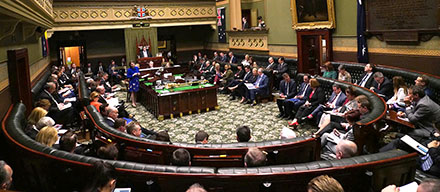The headline online on Thursday screamed “Parliament compelled by 20,000 petitioners to debate future of native forest logging”.
Another headline read “20,000 people force parliament to debate ending native forest logging”.
Well, some of that was sort of accurate.
First the facts.
The future of native timber in New South Wales will be debated in the State’s Parliament, probably within the next month. But not definitely.
And the debate does follow the arrival of an online petition circulated by the Brooman State Forest Conservation Group calling for an end to native timber logging in the State.
But, and it’s a really big “but”, the 20,000 petitioners did not compel anyone, or anything to do anything at all. Nor did 20,000 people force parliament to do anything.
What the green lobby was in fact celebrating was simply the triggering of a rule in the NSW State Parliament that says any petitions – that’s any old petition – of more than 10,000 signatures, or 20,000 for electronic petitions, are compelled to be scheduled for debate in the Lower House.
That’s it. The petition hit the 20,000 electronic signature mark.
A petition hitting the 10,000-signature mark, or 20,000 online, demanding that bicycles be banned from city streets would also be debated.
The main problem here that could be considered is the validity of signatures or otherwise on online petitions.
Forest & Wood Communities Australia director Kelly Wilton acknowledged in March this year that petitions are a great tool to measure the feelings of a community and done properly they can help guide or influence decision making. To do this they need to be an accurate reflection of the community affected.
But she wrote that, when they are used as a political weapon, with no consideration for the local community and ignorant of the basic rules that govern their legitimacy they lose all credibility. Not just of the undersigned but of the cause and those pushing it.
Referring to a petition raised in Tasmania, she said it turned out that of the last 100 signatories 36 had an address of “Australia” only (contrary to the requirements), only 12 were even from Tasmania, it included international signatures and at least one duplicate.
That’s the great thing about online petitions, she said.
“You can attract serial petitioners; all it takes is one click. It couldn’t be easier to be an environmental warrior, from the comfort of your inner-city apartment sipping your chai latte.”
This petition in NSW may not have any of those failings; its 20,000 electronic signatures may well be, and no doubt is from 20,000 people with serious concerns about what they have been told should be the future of the timber industry in NSW.
But at the end of the day three factors will end the petition’s progress.
The first is that the Liberal Government in NSW, given it seems to be imploding, will have little appetite for such a debate.
Neither will the Labor Opposition which this week told the ABC it was unlikely it would have an official position on phasing out the native forest logging industry before the state election in March 2023. After that, who knows?
But therein lies the third reason; a state election in March 2023.
So, to claim that 20,000 people have forced the NSW Parliament to debate ending native forest logging is drawing an extremely long bow.
Of course, it will be celebrated as a victory of sorts in certain circles.
But in reality, it might at best be just a celebration of obtaining enough signatures to trigger an uncaring parliamentary rule.







